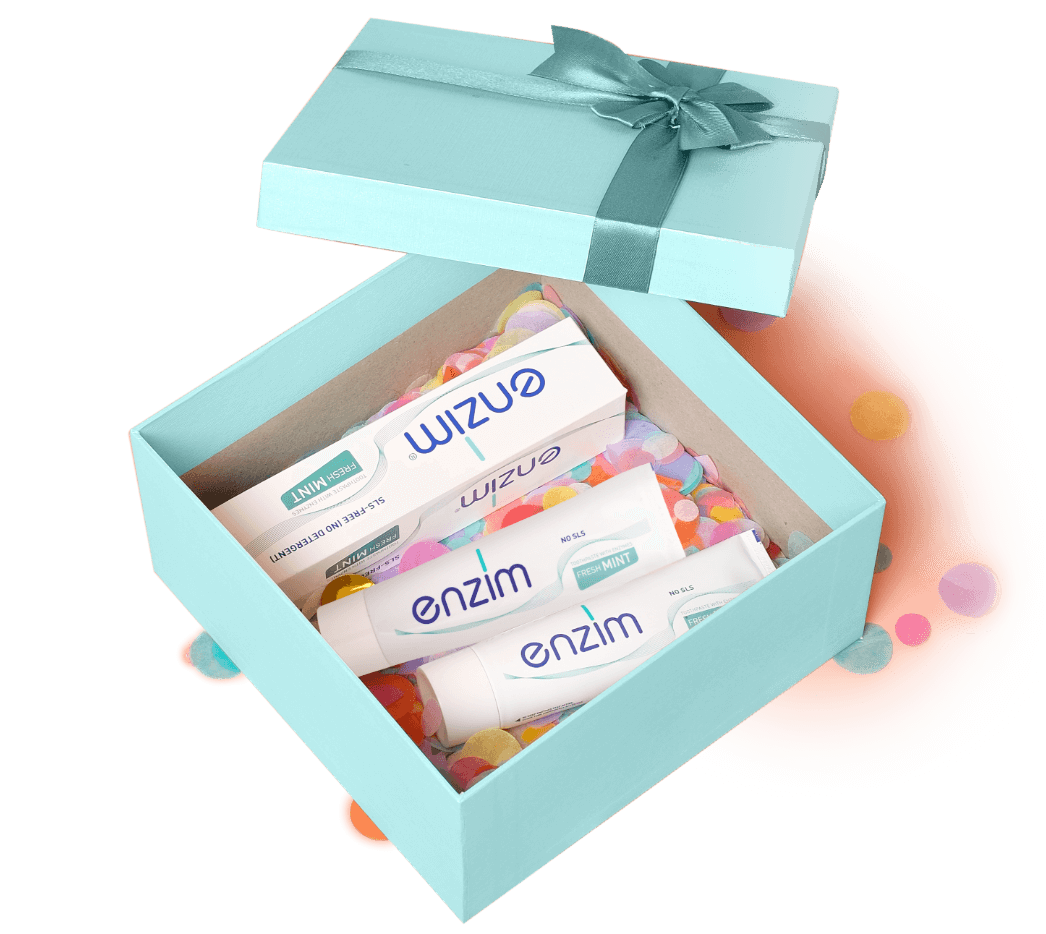7 Mistakes That Make Your Mouth Ulcers Worse And How to Avoid Them

7 Mistakes That Make Your Mouth Ulcers Worse And How to Avoid Them - Enzim Singapore
Mouth ulcers, also known as canker sores or aphthous ulcers, are small lesions that can bring big discomfort. While many heal on their own, some seem to linger and others keep coming back. Often, the reason isn't the ulcer itself, but the small habits we overlook in our daily lives. From brushing too hard to using irritating toothpaste, these common mistakes can delay healing and even worsen the condition of mouth sores.
In this article, we'll uncover the 7 biggest mistakes people make when dealing with mouth ulcers and canker sores and how to fix them. You'll also discover why switching to Enzim Toothpaste could be one of the most effective changes in your healing routine for better oral health and to reduce inflammation associated with mouth sores.
Mistake 1: Using Toothpaste That Contains SLS
One of the most common and overlooked triggers for mouth ulcers and canker sores is Sodium Lauryl Sulfate (SLS), a foaming agent found in many commercial toothpastes. While it helps create that satisfying lather, SLS can irritate the soft tissues inside your mouth, especially if you're prone to mouth sores or have a sensitive mouth lining.
The Fix:
Switch to an SLS-free toothpaste like Enzim. Formulated with natural enzymes and free from harsh foaming agents, Enzim Toothpaste is gentle on your mouth's sensitive tissues. It cleans effectively without causing irritation, making it ideal during ulcer recovery or as a preventive daily solution for maintaining good oral health and preventing minor canker sores.
Mistake 2: Eating Acidic, Spicy, or Crunchy Foods
Even a single canker sore can become unbearably painful when it comes into contact with acidic or spicy foods like citrus fruits, tomatoes, hot peppers, or vinegar-based dressings. Similarly, hard or crunchy snacks (like chips or toast) can scrape against the sore and make it worse, intensifying the burning sensation. Hot drinks can also exacerbate the discomfort of mouth ulcers.
The Fix:
During an active mouth ulcer episode, stick to bland, soft foods like mashed potatoes, bananas, rice porridge, and boiled vegetables. Avoid anything too hot in temperature as well, as it may irritate the sore further. Once the ulcer heals, reintroduce acidic foods slowly to test your tolerance and prevent future mouth sores. Be mindful of any food intolerance that might contribute to recurring ulcers.
Mistake 3: Brushing Too Hard or Using a Stiff Toothbrush
Good oral hygiene is important but being too aggressive can backfire. Brushing with too much force or using a hard-bristled brush can cause tiny cuts or irritate existing ulcers, making the problem worse and potentially leading to complications like a mouth injury or worsening of herpetiform canker sores.
The Fix:
Use a soft-bristled toothbrush and adopt a gentle brushing motion. Pair it with a mild toothpaste like Enzim, which works with your body's natural defenses rather than stripping away protective layers in your mouth. Enzim Toothpaste is ideal for sensitive mouths, especially during flare-ups of minor canker sores or herpetiform canker sores. Be cautious of any sharp tooth that might cause an accidental bite and lead to ulcers.
Mistake 4: Skipping Meals or Dehydration
Some people skip meals or reduce their food intake because eating becomes painful during a mouth ulcer episode. But this can lead to dehydration or low nutrient intake two factors that slow down your body's healing process and may even contribute to the development of more serious conditions like Crohn's disease or other gastrointestinal diseases.
The Fix:
Even if chewing is uncomfortable, try to consume soft, nutrient-rich foods and drink plenty of water. Nutrients like B12, folate, and iron are crucial for tissue repair. Smoothies, soups, and yogurt can provide calories and vitamins without irritating the ulcer. Maintaining a nutritious diet is essential for overall oral health and can help prevent future mouth sores. If you suspect a vitamin deficiency, consider getting blood tests to identify any underlying issues.
Mistake 5: Ignoring Stress as a Trigger
Emotional stress may not seem like a physical trigger, but it's a known contributor to immune system dysfunction and mouth ulcers are one of the first places where signs of internal stress can show up. Lack of sleep and hormonal changes can also play a role in the development of canker sores and may even trigger a tingling sensation before an ulcer appears.
The Fix:
Track when your ulcers appear. If they tend to show up after stressful events or sleep deprivation, that's a clue. Incorporate simple stress management habits like deep breathing, meditation, journaling, or light physical activity. Your mouth (and mind) will thank you. Ensuring adequate sleep and managing hormonal changes can also help reduce the frequency of mouth sores. Some people find that beta blockers prescribed for other conditions may help with stress-related ulcers, but always consult a healthcare professional before starting any new medication.
Mistake 6: Not Treating Vitamin Deficiencies
Chronic mouth ulcers may be a sign of underlying vitamin deficiencies. Low levels of vitamin B12, folate, iron, or zinc can impair your body's ability to heal and maintain a healthy mucous membrane in your mouth. In some cases, a family history of certain deficiencies might increase your susceptibility to mouth ulcers.
The Fix:
Consider seeing a healthcare provider to test for deficiencies, especially if you get ulcers regularly. Supplements or dietary changes can make a huge difference. In the meantime, improve your oral environment by brushing with Enzim Toothpaste, which is free from irritants and supports tissue health. A balanced, nutritious diet can also help prevent vitamin deficiencies and support overall oral health. Be aware that certain medications like bisphosphonates or immunosuppressant medications might affect nutrient absorption and potentially contribute to ulcer formation.
Mistake 7: Poking, Picking, or Scraping the Ulcer
It's tempting to "check" on your ulcer with your tongue or fingers but touching or picking at the sore can introduce bacteria and delay healing. This can also lead to a more intense burning sensation and increase the risk of complications, potentially even leading to mouth cancer if the habit persists and causes chronic irritation.
The Fix:
Leave it alone. The less contact the ulcer has with irritants or bacteria, the faster it will heal. Focus instead on keeping your mouth clean and avoiding sharp foods. A mild toothpaste like Enzim, which is free from alcohol and SLS, can clean the area without disrupting the healing process. For pain relief, consider using a salt mouthwash or an antimicrobial mouthwash containing chlorhexidine gluconate, as recommended by your dentist. Some people find success with home remedies like applying milk of magnesia or a small amount of honey to the ulcer, but always consult with a healthcare professional before trying new treatments.
How Enzim Toothpaste Helps in the Healing Process
Let's take a closer look at why Enzim Toothpaste is a smart choice for anyone struggling with mouth ulcers:
1. SLS-Free Formula
Eliminates a common ulcer trigger without sacrificing cleanliness or freshness.
2. Enzyme-Based Protection
Uses naturally derived enzymes to support the balance of beneficial bacteria in the mouth, which is essential for healing and maintaining good oral health.
3. No Harsh Chemicals
Free from alcohol and irritating agents that can worsen pain or prolong healing of canker sores.
4. Gentle for Daily Use
Safe enough to use multiple times a day even during active ulcers without stinging or burning.
Whether you're in the healing phase or simply prone to getting ulcers often, making Enzim part of your daily oral care can support both treatment and prevention of mouth sores.
Building Better Habits for Long-Term Relief
Avoiding these 7 mistakes can greatly improve your ulcer experience and may even reduce how often they occur. Here's a quick daily checklist for individuals prone to mouth ulcers and canker sores:
-
Brush with Enzim Toothpaste
-
Use a soft-bristled toothbrush
-
Stay hydrated
-
Avoid spicy and acidic foods
-
Get enough B12, iron, and folate
-
Manage stress and ensure adequate sleep
-
Don't pick at your ulcers
-
Replace your toothbrush every 2-3 months
-
Avoid tobacco use, as it can irritate the mouth and trigger ulcers
Final Thoughts
Healing mouth ulcers and canker sores doesn't have to be a painful guessing game. By recognizing what might be making your ulcers worse — and correcting those habits — you can speed up healing, reduce pain, and prevent future episodes. One of the easiest and most impactful changes is switching your toothpaste to Enzim — a gentle, SLS-free formula designed with your mouth's natural health in mind.
Sometimes, the smallest adjustments make the biggest difference in managing mouth sores. Start with your oral care routine — and start with Enzim. If you experience persistent or severe mouth ulcers, consult with a healthcare professional to rule out more serious conditions like oral cancer, herpes simplex virus (which causes fever blisters), or other complications that may require medical treatment or topical treatments like antiseptic gels or steroid mouthwashes.
Remember, while occasional mouth ulcers are common, frequent or severe occurrences might indicate an underlying issue. Pay attention to your body, maintain good oral hygiene, and don't hesitate to seek professional advice if you're concerned about your oral health. In some cases, medications like nicorandil may contribute to mouth ulcer formation, so discuss any concerns with your healthcare provider.
By following these tips and being mindful of your oral health, you can minimize the impact of mouth ulcers and enjoy a healthier, more comfortable mouth.
